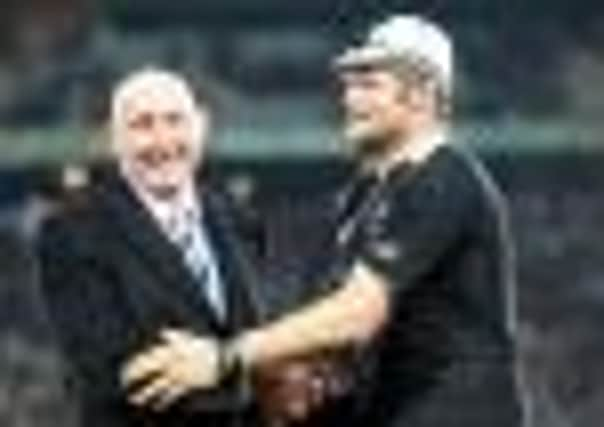All Blacks hero Jock Hobbs dies at 52


The NZRU said Hobbs died yesterday at Wellington Hospital, where he had been admitted last week when his health suddenly deteriorated as a result of the illness he had battled for several years.
He captained the All Blacks in 16 of his 39 matches, including four of his 21 Tests between 1983 and 1986. He retired from playing aged 26 after a series of concussions.
Advertisement
Hide AdAdvertisement
Hide AdHobbs became a board member of the NZRU in 1995 and, after losing his seat in 1996, returned as its chairman in 2002. In that capacity, he led the team which, in 2005, bid successfully for hosting rights to the 2011 Rugby World Cup. He gave up the high-profile position in December 2010 due to his ill health.
“It is with a heavy heart that we acknowledge the passing of an incredible New Zealander,” said Mike Eagle, who replaced Hobbs as NZRU chairman.
“New Zealand has lost an inspirational leader with an incredible passion for the game of rugby and the part it plays in our lives.”
Hobbs forged a reputation as a rugged and hardworking openside flanker for the famous Canterbury province before making his Test debut against the British and Irish Lions in the second match of the 1983 series in Christchurch.
He succeed Graham Mourie in the All Blacks’ No 7 jersey and, despite strong competition, established himself as New Zealand’s first choice in the position for the next three years.
He first captained the All Blacks in Fiji in 1984, in the absence of regular captain Andy Dalton and for the first time in a Test in Argentina the following year. All of his Test matches as All Blacks captain were played overseas.
Hobbs was a member of the rebel Cavaliers team which toured South Africa in 1986 and which contained most of the players prevented by legal action from touring South Africa with the All Blacks in 1985.
Hobbs was suspended for two Test matches for his role in the rebel tour and later admitted his regret at taking part.
Advertisement
Hide AdAdvertisement
Hide AdHe was a strong candidate to captain the All Blacks at the first Rugby World Cup in 1987 but a concussion earlier that season forced him into retirement.
He practiced as a barrister and then pursued a successful business career which led to his appointment to the board of the New Zealand union. In his first term on the board he helped head off attempts by the rebel World Rugby Corporation to contract leading New Zealand players.
With his help, New Zealand retained all of its leading players as rugby changed from an amateur into a professional game. Hobbs returned as chairman of the New Zealand union in 2002, amid fallout over the country’s failed bid to secure co-hosting rights with Australia for the 2003 World Cup.
He played a major role in putting together the bid that secured the 2011 tournament at the expense of Japan. Despite by then having a reduced role, Hobbs presented All Blacks captain Richie McCaw and fullback Mils Muliaina with commemorative silver caps when they reached the 100-appearance milestone for the team.
Hobbs had resigned from the chairmanship but was in the official delegation who presented winners medals and the Webb Ellis Cup to McCaw and the All Blacks after their 8-7 victory over France in the World Cup final at Eden Park in October.